| |
"I put the head of the nurse where it bothered the viewer the most. That shot was not going to hold your attention long enough for the conversation between Nishi and the doctor to end, even though the tree outside the window with the green leaves blowing in the wind was a nice touch. When I put the nurse in the front of the shot, she was really in the way. But when I shot her out of focus, it had a different effect. My staff had a fit. According to the rules of filmmaking, it's the last thing you're supposed to do. But when I did it, it kind of worked. Film theory is always evolving and the audience is evolving with it. I think we can afford to turn things around a little, and the audience will follow." |
| |
Director Kitano Takeshi on his unconventional approach to framing and scene construction.* |
Every time I get to talk about a film by the multi-talented Takeshi Kitano (actually Kitano Takeshi in his native Japan, so let's go with that), I feel almost obliged to at least mention the extraordinary range of artistic careers in which he has found success and to recall how I first discovered his work as both an actor and director. But I did that back in 2008 in my overview of a DVD box set of his films released by Second Sight – a set I never got around to completing my coverage of – which you can read here.
When working simultaneously as director (as Kitano Takeshi) and actor (as 'Beat' Takeshi), Kitano tended to cast himself as maverick tough guys on opposing sides of the law. Having played the title character in Violent Cop, he switched sides to play a psychotic gangster in Boiling Point and a yakuza boss in hiding in the superb Sonatine, the film that cemented his growing reputation as a filmmaking talent to be seriously reckoned with, at least outside of his native Japan. Then in 1994 he was involved in a serious scooter accident that left him with fractured cheekbones, a fractured skull and contusions of the brain. He spent a month in intensive care and emerged with partial paralysis of the right side of his face. For a while it really did look as if his mainstream media career might be over, then in 1996 he directed the enthrallingly autobiographical Kids Return, a film in which he did not appear but which confirmed beyond all doubt that his behind-the-camera skills were as sharp as they ever had been. Then following year he made Hana-Bi, and for the first time since his accident played the lead role in one of his own films. Although once again the hard man, this time he cast himself as policeman driven by personal tragedy to cross the line of law into criminality. For my money it's one of this singular filmmaker's most extraordinary and emotionally affecting works, and one whose Golden Lion win at the Venice Film Festival finally saw him recognised as a director of note in Japan.
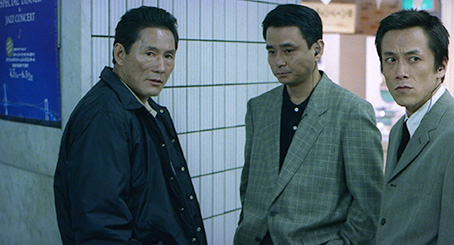
Here Kitano plays Nishi, a seasoned detective whose personal life has been clouded by misfortune – his daughter died at a very young age and his wife Miyuki (Kishimoto Kayoko) has since been diagnosed with terminal leukaemia. While on a stakeout with three of his fellow officers – long-term colleagues Tanaka (Ashikawa Makoto) and Horibe (Ôsugi Ren), and the younger Nakamura (Kitano regular Terajima Susumu) – he accepts Horibe's suggestion that he take time out from his duties to visit Miyuki in hospital. Horibe agrees to cover Nishi's shift, during which he is ambushed and shot by the man for whom the detectives had been searching, an attack that leaves him confined to a wheelchair and abandoned by his family. Haunted by guilt and owing a sizeable sum to a local yakuza gang for the cost of his wife's medical care, Nishi single-handedly robs a bank, the spoils from which he uses to pay off his debts and take a final road trip with Miyuki, unaware that he is being pursued by his former colleagues and yakuza money lenders looking to sting him for interest payments.
One of principal things that distinguishes Kitano's filmmaking style is his creatively minimalist approach to scene construction and editing (Kitano is his own editor), compressing action that would be loudly showcased by others into two or three near static and precision timed shots, a technique often (but not always) employed for comic effect. Confrontations are sometimes not shown at all, with the build-up cutting almost directly to the aftermath, leaving it to us to imagine what display of strength or speed or even foolhardiness (see Kikujiro to witness this one at its best) was required to arrive at the usually decisive result. It's an approach beautifully demonstrated in this film's opening scene. We're introduced to the silent and motionless Nishi in close-up as he stares unemotionally through the camera at two overall-clad manual workers wearing would-be hard guy expressions. Nishi looks down and we see the mess that's been made of the bonnet of what we can assume is his car, on which the men have clearly eaten their lunch. A wide shot tells us more about the location (traditionally this would come first) and the proximity of the three men to each other, but still no-one moves. Cut to a close-up of Nishi's hand suddenly pulling something from his pocket and then in the snap of an edit we're inside the car, looking out at the younger of the two men as he washes the windscreen while Nishi stands behind him looking stoically on. Cut to exterior wide, and when the young man slips, Nishi kicks him so hard he slides off the car and falls sharply onto the ground. Not only is it a beautifully shot and edited sequence, it tells us a three important things about our lead character: that he's not one for conversation; that he'll take crap from no-one; and that he is probably not a man you want to mess with in a hurry. All this with no dialogue and precious little character or camera movement. No-one does this sort of thing better than Kitano Takeshi.
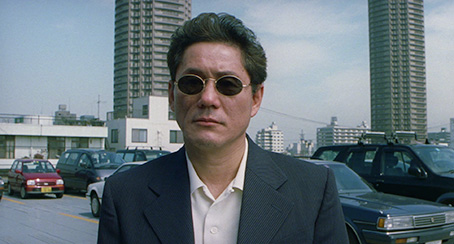
Later the scene is revisited with similar economy, as Nishi walks across the same car park in a rare tracking shot, taking off his jacket and wrapping it around his left hand as he does so in preparation for a fight we at this point aren't even aware is imminent. The confrontation that follows is covered in completely unexpected fashion, a pair of half-second close-ups establishing intention, the sound of an unseen scuffle playing out over a motionless shot of the older worker watching silently on, a knife clattering to the ground, a punch seen only in shadow and the younger man falling into frame considerably the worse for wear. The consequences for Nishi are revealed in a close-up of a cut on his hand as he is driving away and the wound on his chest being dressed when the doctor brings him Miyuki's medication at the hospital. Both this and the opening are cinematically thrilling scenes, yet these are not stand-out sequences but Kitano's standard modus operandi.
There is, I would venture, a sizeable essay to be written about the editing of this film alone, from the brilliantly executed shock cuts – the lighting of a cigarette that snap-cuts to the firing of pistol, or the click of an empty gun followed instantly by a violent splash of red paint hitting a suicide themed painting – to shots that are held for almost meditative length, or the time jumps that reduce potentially lengthy expositional scenes down to their bare essentials. Kitano also reveals a key aspect of the story in non-linear fashion, trusting us to connect initially abstract dots when the full picture becomes clear. Thus Nishi meets with the widow of a policeman who died in the line of duty before we know who she is, who it is that has died, and why Nishi feels the need to pay the woman a discomforting personal visit. The explanation unfolds in gradually expanding flashback, slow motion snippets of a shooting whose context and impact on Nishi will only become clear as the film progresses.
Seemingly throwaway moments sometimes resonate later, as when Horibe concludes a sombre and one-sided discussion with Nishi about the prospect of life in a wheelchair and the notion of taking up painting as a hobby with the amusingly deadpan comment, "Maybe I'll buy a beret." Later, when Horibe is unpacking art materials, we realise that they have been sent to him by Nishi not because of anything said or written on the packaging but because of the beret Horibe finds in the box, headgear he later tries out and quickly dismisses. That the surrealistic paintings that Horibe creates are all Kitano's own (as are all of the paintings seen in the film) may seem a tad self-indulgent, but there is a strong autobiographical element at work here – Kitano himself took up painting following his accident, and many of the paintings here were created during his recovery period, art as therapy that may or may not work as well for the isolated Horibe.
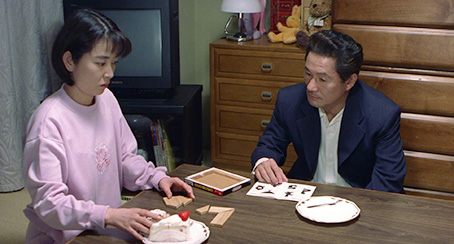
Although it has its moments of sudden and explosive violence, what really strikes you about Hana-Bi is its stillness. Silence plays an important role here and is reflected in the taciturn Nishi's seeming lack of emotional expression. Indeed, there's almost a sense that Kitano was looking to make a virtue of his partial facial paralysis by creating a character so coolly inexpressive, hence his decision to repeatedly hide his eyes behind oval sunglasses that seem to have serious intentions of their own. In a moment of almost throwaway black comedy, when the time comes for Nishi to take Miyuki home because the hospital can no longer do anything for her, the doctor advises him to talk to her as much as he can, but the two are on the road on their final holiday before they exchange a single word. It's here that a very different side of Nishi emerges, one that laughs and jokes with the woman he dearly loves and whose company he may well be unable to contemplate losing. As the story unfolds, what starts out as a crime drama evolves into a story of love, loss and commitment, one so beautifully understated and so heartbreakingly believable that when Nishi and Miyuki stand silently by the shore late in the story and Miyuki finally breaks her film-long (and, we can assume, trauma-induced) silence to deliver a final and apologetic "Thank you" to her husband, it sends the tears rolling down my face on every viewing.
If this all sounds a little heavy, know that the potentially serious tone is repeatedly lightened by Kitano's signature moments of offbeat character humour. Inventively staged slapstick gags (Miyuki falling into the snow up to her armpits occurs off-screen while the camera is focussed instead on Nishi's reaction) are balanced by those with unexpected punch lines and semi-surreal echoes. A personal favourite involving Nishi and a pair of baseball-playing youths is funny in itself, but when we see them again a short while later they appear to have made no attempt to retrieve their lost ball and are instead idling wistfully as if waiting for another to somehow magically drop into their laps. Elsewhere humour is used as a transitional device, as with the mind-reading game Nishi plays with Miyuki at the start of their trip, a delightfully handled sequence with an amusing payoff that provides us with our first glimpse of the couple in cheerfully upbeat mood, a window to less troubled times that Nishi is hoping to temporarily revisit. The comedy can even be character defining, as with the burly junk yard owner Tesuka (Watanabe Tetsu, another Kitano regular), who is angry at just about everyone (including his wasted, glue-sniffing daughter) but instantly warms to Nishi when he tells him that he wants to buy a scrapped police light because he is thinking of robbing a bank.
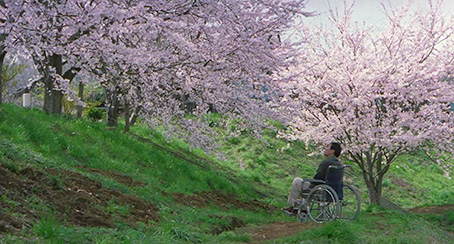
I've seen the case made for Hana-Bi as Kitano's finest film as director, playing as it does as a culmination of his earlier experiments with form and style infused with the autobiographical elements and emotional maturity of Kids Return, and while for me Sonatine remains my personal favourite, Hana-Bi runs it a damned close second. There are so many thoughtful and inventive aspects to this remarkable film (I've barely touched on them here) and Kitano repeatedly sidesteps the obvious when it comes to how a sequence should be filmed and edited (the bank robbery alone is like none you'll ever have seen). Even six or seven viewings in I found myself thrilled by things I never noticed previously and marvelling and Kitano's confidence and creative skill with a medium in which he had no formal training. Hana-Bi is an exquisite work from one of the most distinctive and imaginative of modern filmmakers, and remains one of Kitano's most beautifully structured, emotionally affecting and dramatically rewarding works to date.
In some ways the 1.85:1, 1080p transfer here is a substantial step up on my previous Bandai Japanese DVD. The blue tone to some scenes – the so-dubbed 'Kitano Blue' – was achieved through production design, costume and lighting rather than post-production tinting, and colours are thus impressively rendered, with largely naturalistic flesh tones and vivid reproduction of brighter colours, especially those on Horibe's paintings. The contrast is nicely balanced and the black levels solid, and while the sharpness is not quite reference quality, the level of detail is seriously impressive and leaves the Bandai DVD standing. As you would hope, the image is free of dust and damage and displays no untoward movement in frame. On glummer interiors the image sometimes does not feel quite as vibrant (though I'm willing to bet this is deliberate), but for the most part this is a fine transfer that really shines on daylight exteriors, of which there are many.
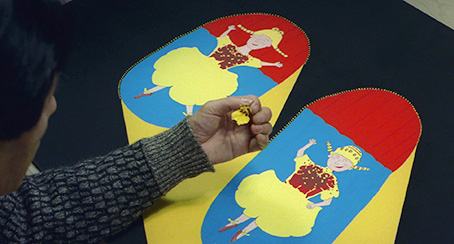
The Linear PCM 2.0 surround audio track is in excellent shape, with crisp reproduction of dialogue and effects (the above mentioned shock cut to the shooting of Horibe is made all the more startling by the clarity and volume of the gunshot), and Joe Hisaishi's sometimes melancholic score is handsomely showcased.
Commentary
Seemingly every time I get a little cynical about so-called expert commentary tracks on Blu-ray and DVD releases, one comes along that prompts me to re-evaluate this view. Conversely, just when I'm starting to warm to such commentaries, I seem to encounter one that re-awakens my cynicism. Such is the case with this initially promising track by former Japan Times critic Mark Schilling. It starts with an overview of Kitano's career as a director and observations on his filmmaking style, much of which will be useful for newcomers to Kitano's cinema, but by the halfway point Schilling is spending way too much simply describing what happening on screen, and by the two-thirds mark this has effectively become an audio descriptive track for the visually impaired ("He makes his escape – police cars coming in the opposite direction..."). Schilling sounds like an amenable guy and clearly admires the film and Kitano as a director, but I'm afraid I got very little from this.
Interview with Director Kitano Takeshi (14:47)
A slightly rag-tag piece conducted in 1999 for a French TV screening or DVD release that intercuts an interview with Kitano with footage shot of him on lively form in a Radio Tokyo studio and illustrates it with archive photos of the younger Kitano and extracts of a couple of his TV appearances shot by pointing a hand-held camera at a television. Classy. There's good stuff in the interview, however, as Kitano talks about his relationship with violence, this influence of his manzai comedy roots, the difference between Kitano and 'Beat' Takeshi, his reluctance to portray intimacy on screen, and more.
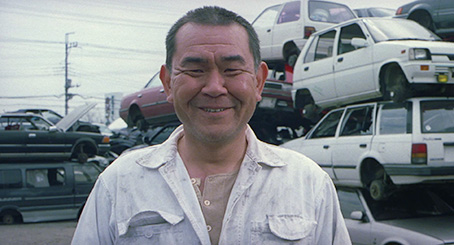
Director Kitano Takeshi Retrospective (27:14)
A slightly misleading title for a featurette whose first 12 minutes consist of Japanese trailers for Kitano's first 7 films as director (some of which are peculiar sells), but whose remaining running time is made up of behind-the-scenes footage of him directing a number of sequences from Hana-Bi. A most welcome look at Kitano the director at work, it has its share of entertaining moments, the best of which sees the actor playing a man who insults Nishi's wife having his face repeated kicked into water, then the camera pans to reveal Kitano in the director's chair laughing himself silly at the sight.
UK Trailer (2:16)
A nicely edited promo for the remastered HD version that does highlight the violence but still had me sold.
One of my favourite films from one of my favourite directors gets a long-awaited and impressive looking HD upgrade. The commentary did nothing for me, and while the retrospective/behind-the-scenes featurette is ported over from the previous DVD, it's still well worth having. This is one release that's worth having for the film alone, however, an endlessly re-watchable blend of offbeat crime drama and understated love story. How could I not be recommending this with all of my heart?
* from an interview with Kitano Takeshi by Makoto Shinozaki Studio Voice Magazine, November 1997
|